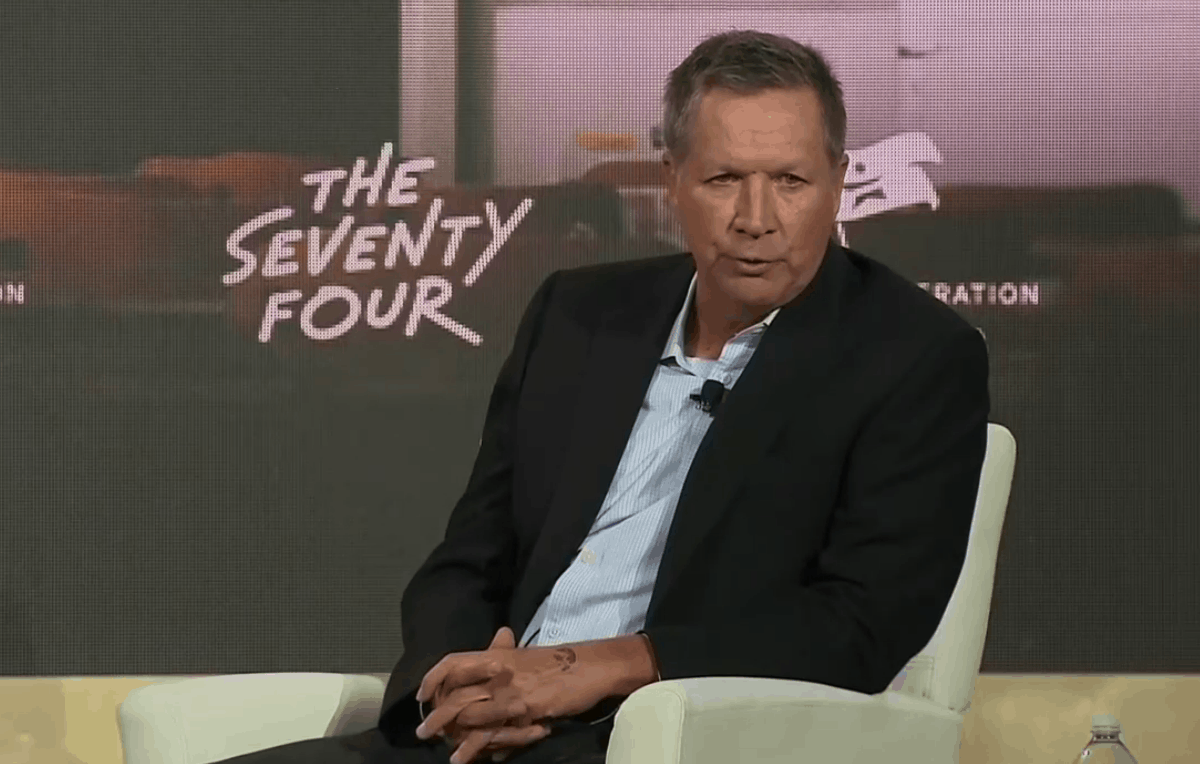
Republicans vying to become their party’s nominee for president gathered in New Hampshire today to discuss education.
The 2015 New Hampshire Education Summit, sponsored by the American Federation for Children and hosted by The Seventy Four — a nonpartisan, nonprofit education news website — brought to New Hampshire former Florida Governor Jeb Bush, New Jersey Governor Chris Christie, Carly Fiorina, Louisiana Governor Bobby Jindal, Ohio Governor John Kasich, and Wisconsin Governor Scott Walker.
The wide-ranging talks covered subjects like Common Core, vouchers, the role of the federal government, and the presidential power to influence education.
Wednesday morning, Fiorina, Bush and Kasich had their turn.
School Choice
Bush said he supports all kinds of education choices for parents. Vouchers and charter schools offer public schools a competitor that will force them to improve, he said.
“Every school is going to have to get better or they’re going to lose their students,” he said.
If the students go, jobs and funding will go with them, so Bush says public schools professionals will be spurred to make sure their students get a good education.
He notes the success of charters in states that have embraced them, such as Florida and New Orleans.
“The public schools are getting better. They have to get better or they close,” he said of New Orleans, where the majority of students attend charters.
Fiorina also noted the success of New Orleans. After Katrina, she said New Orleans had to start from scratch and was forced to innovate. Their experiment has shown the importance of innovation to transform education, she said.
“Their results are better… than they had been for 50 years prior to Katrina,” she said.
But while charters are a good thing, she cautioned that some states can take it too far. She noted Texas, which she said had a great charter school system. But she said the state went too far when it began to hand out charter licenses without paying attention to the quality of the applicants.
Kasich discussed the value of charter schools and vouchers in Ohio. He lamented the fact that not enough parents are taking advantage of the vouchers that are available. And he also discussed the danger of failing charter schools, saying they need to be held accountable just like everyone else.
“We’re not going to tolerate failed charter schools. I don’t care what kind of education environment you have. We’re not going to tolerate failure,” he said.
But he was also quick to address those who attack charter schools, saying that it’s easy for people in public education to criticize charter schools while ignoring the traditional public schools that are also failing.
Common Core
Two of the three candidates — Bush and Kasich — who spoke Wednesday morning are magnets for criticism over their support of Common Core.
The standards were a central theme in the Q & As of the candidates. Bush said he had no problem with people who dislike Common Core. But he stressed that if you’re not going to use it, you have to come up with high standards to take its place.
He also said states should be the sole arbiter of their education standards.
“This shouldn’t be federally driven,” he said. “The federal government should have nothing to say on this.”
Kasich said that prior to adopting Common Core, Ohio had low standards. Students could get good grades and still not be ready for college.
“If you have a low bar, everybody gets to jump over,” he said.
Now, he says, Ohio’s standards are rigorous, but he said that decisions about school curriculum are decided by local districts with input from parents.
Kasich said that as the debate over Common Core rages across the country, he has never said anything to suggest that the federal government should be able to control state education.
“Did you hear anything out of me that didn’t represent local control?” he asked.
Fiorina said that Common Core has gotten out of control, having started out as a set of standards that then got taken over by businesses — like testing companies — with vested interests.
She said, however, that internationally benchmarked standards and assessments are essential. Without them, we wouldn’t have good student achievement data — for instance, that per-pupil spending continues to go up while students keep underachieving, and that an achievement gap exists between high- and low-income students.
“On the other hand, that’s very different than a federally mandated program around what to teach and what to learn,” she said.
She criticized that way the federal government dangles economic incentives as a means of getting states to adopt programs like Common Core.
And while she thinks it’s important to test students to see how they’re doing, she said assessments have gotten out of control with so many examinations that teachers are forced to teach to the test and students must learn to the test.
Federal Overreach
The three candidates also had strong things to say about the role of the federal government in education.
Bush said he wants to see the federal government be a partner in school reform, allowing states “portability” in how they use federal funds, rather than forcing them to act in the specific way desired by federal officials.
In Florida, he said 10 percent of education funding came from the federal government, but 80 percent of the bureaucrats were busy handling the requirements that come along with federal money. He said it should be the other way around.
And he dismissed the success of programs like Race to the Top, saying that most states didn’t have increased student achievement as a result. Florida did, he said, but that was because of its “accountability” on school choice.
Fiorina said that if people want to change education, they have to look at what works and what doesn’t. She said what doesn’t work is clear: big federal government programs like No Child Left Behind and Race to the Top.
“I think what we have today, unfortunately, is federal government money is being used to pick winners and losers,” she said.
She said she wants to make the U.S. Department of Education smaller, and put more money and responsibility in the hands of states.
“The truth is we don’t know what the Department of Education is doing anymore,” she said.
She also said the U.S. needs a top down audit of federal education programs, and if a program is working, officials need to determine if the federal government is really the best place for it.
Kasich was far less vehement when it came to the federal government, saying that he believes in the Department of Education, as well as welfare and job training.
He said Republicans make a mistake when they say they want to destroy the Department of Education.
“When we used the rhetoric… you know what independent voters heard? ‘Oh, the Republicans are going to kill education,’” he said.
He did, however, say that money, influence and power needs to flow out of Washington, D.C., and into the hands of states.
He mentioned one time when he called a Washington, D.C., official, and the official asked him what the time zone is in Ohio.
“If they don’t know the time zone, how are they going to fix our problems?” he asked.
Unions
As each candidate expressed the desire to give more local education control to states, they were questioned as to how that would work when unions play a powerful role in education in some states. Will unions be a partner, or a hindrance?
Bush said that the role of the American Federation of Teachers (AFT) and the National Education Association (NEA) is to collectively bargain, not to look out for student achievement.
“I’d love a day where Randi Weingarten (president of AFT) and I could hold hands and sing Kumbaya,” he said, adding, “She’s not going to change.”
He said he’s tried to work with unions before, and it didn’t work. Asked what he thinks Democratic presidential candidate Hillary Clinton said to the AFT to get their endorsement, Bush said: “Don’t worry about me. Worry about Jeb.”
He also discussed competency-based education, which he thinks is the future for schools. Under this strategy, students can learn at their own pace with a teacher there to guide them. If students have mastered a subject, they can move on. But Bush said unions stand in the way because they’re afraid it will loosen their hold on teachers.
“They want to have a collective bargaining entity that is subservient to them where they can negotiate like it’s 1950.”
Fiorina said teachers unions support the status quo, and change is needed to fix education. She cited the issue of school choice — vouchers, charter schools — as one area where unions were particularly combative.
“Most of the teachers unions are on the wrong side of this issue,” she said, adding that most Democrats are too.
She also said it was a problem that unions reward seniority, rather than merit. She said for the unions, it doesn’t matter if a teacher is good, just how long they’ve been teaching. A reformed education system would be based more on teacher achievement.
Kasich zeroed in on a troubled school district in Youngstown, Ohio, that officials around the state were struggling to fix. He said the union resisted these efforts to the detriment of students.
“We may have lost almost a generation of students, and I’m really upset about it,” he said. “Everybody should have been involved in fixing these Youngstown schools.”
Bully Pulpit
All three candidates were asked about the power of the presidential bully pulpit to influence education.
Bush said he would use the pulpit to stress that the American education system is in crisis. He noted that only 1/3rd of students are career-and-college ready, and that billions of dollars are spent at universities and community colleges for remediating students who graduated high school without adequate academic skills.
He tied these failures in with the ongoing unrest in Ferguson, Missouri, saying that lack of educational opportunity creates kids who are aimless and think the system doesn’t work for them.
“These are huge challenges, and now you see what happens on the first anniversary of Ferguson,” he said.
Fixing education should be the first priority for the next president, he said.
Fiorina said she would use the bully pulpit to have a conversation with the American people about the purpose of education.
She said too much emphasis is given to the connection between education and getting a job, and not enough time is spent on character development or citizen education.
“I worry that we are no longer educating citizens,” she said.
Schools shouldn’t just be focused on STEM lessons, but also on art, history, philosophy, and other subjects that can “feed children’s souls,” she said.
She also said that innovation is the key to education’s future, and the American public needs to be educated that innovation is about risk, and mistakes must be tolerated.
“Innovation at its core is individual experimentation,” she said. “And so we need to understand it in order to have more of it.”
One area that Kasich thought needed to be emphasized more to the American public was the influence of mentoring on student development. A good mentor can show students opportunities, and experiences they never knew were possible, he said.
He bemoaned the negative commentary he said comes out of unions and infects teachers. He said if he were king — not president — he would abolish teacher lounges where “they’re woe is us.”
Learn more about the candidates’ positions on the issues.
Recommended reading



